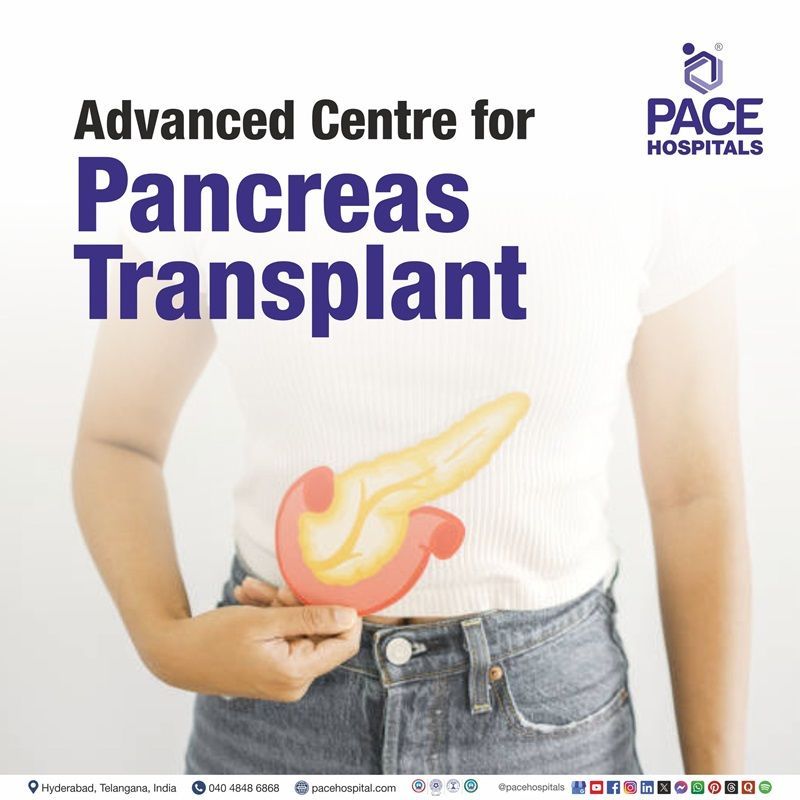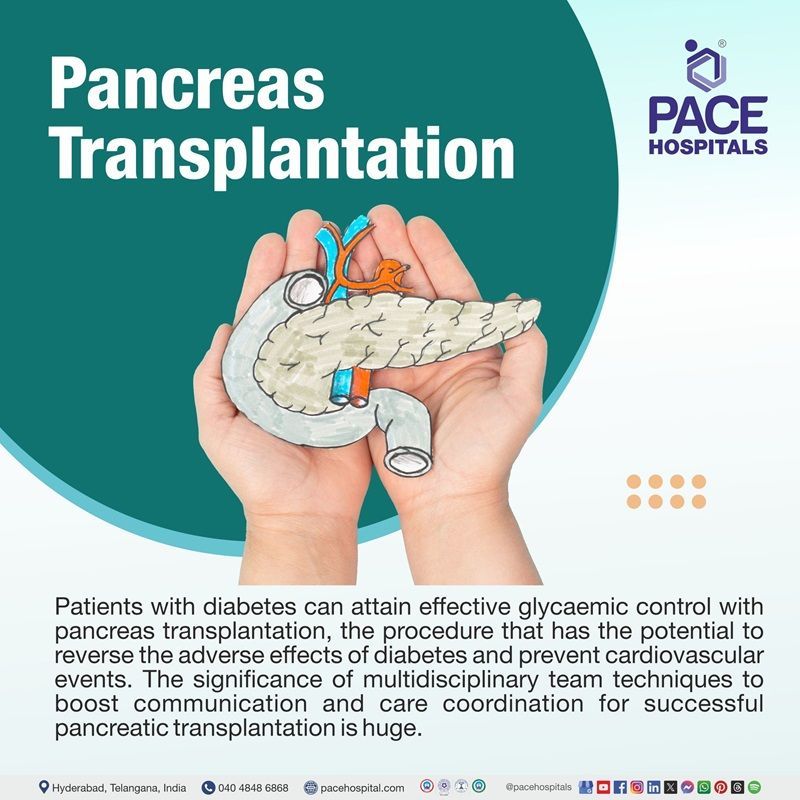Pancreas Transplant in Hyderabad, India | Best Pancreatic Transplantation Hospital
At PACE Hospitals, experience state-of-the-art Pancreas Transplant Surgery led by team of renowned pancreas transplant surgeons with the high success rate at affordable cost. Guiding you towards a healthier future. Schedule your appointment today for world-class organ transplant care in Hyderabad, India.
Request an appointment for Pancreas Transplant
Pancreas Transplant appointment
PACE Hospitals stands as the Best Pancreas Transplant Hospital in Hyderabad, Telangana, India, offering unparalleled expertise and advanced medical care for patients with chronic pancreatic conditions. The hospital is equipped with state-of-the-art infrastructure, cutting-edge technology, and a dedicated team of pancreas transplant surgeons, gastroenterologists, and critical care specialists who work collaboratively to ensure successful outcomes.
PACE Hospitals provides end-to-end services, from thorough pre-transplant evaluations and donor matching to post-transplant care and long-term monitoring, ensuring a seamless experience for patients and their families. The hospital’s focus on patient-centered care is reflected in its personalized treatment plans, strict adherence to international safety standards, and empathetic approach throughout the treatment journey. With a proven track record of excellence in organ transplants, PACE Hospitals continues to set new benchmarks in healthcare, giving patients a chance to lead healthier, more fulfilling lives.
We do not provide the guarantee of obtaining pancreas for transplantations. The patient can get registered at PACE Hospitals for the procurement of a matching pancreas from a donor for transplant. PACE Hospitals keeps greatest effort to ensure the obtainment of pancreas but does not provide any guarantee. Pancreas Transplantation will happen as per state and center govt. rules and regulations.
Patients with diabetes can attain effective glycaemic control with pancreas transplantation, the procedure that has the potential to reverse the adverse effects of
diabetes and prevent cardiovascular events. The significance of multidisciplinary team techniques to boost communication and care coordination for successful pancreatic transplantation is huge.
Background of pancreas transplant
In 1966, WD Kelly carried out the first ever successful pancreas transplant. In contrast to the first pancreatic transplant procedure in 1966, the outcomes of the transplantation have risen substantially over the last three decades due to innovations in medical science and more efficient immunosuppressive therapy.
Definition of Pancreatic Transplantation
Pancreas transplantation is a surgical procedure where the patient receives a healthy pancreas from a donor.
Some patients with
type 1 diabetes may choose to get a pancreas transplant. An autoimmune disease-type 1 diabetes causes the pancreas to stop producing the insulin hormone, as Insulin injections once a day is the standard treatment of type 1 diabetes. In such condition, the patient receives a healthy pancreas from a deceased donor during a pancreatic transplant.
The breakdown, absorption, use, and storage of energy substrates are all significantly influenced by the pancreas. It is made up of two structurally distinct but functionally associated glandular systems called the exocrine and endocrine pancreas. The primordial gut is the origin point of both parts.
Exocrine: Gastrointestinal peptides, which are neurological and hormonal signals, regulate the secretions of the exocrine pancreas. The exocrine system is vital for nutrition digestion.
Endocrine: Just 2% of the pancreas is comprised of the endocrine portion and is composed of numerous islets of Langerhans, or endocrine cells. The regulation of glucose homeostasis depends on the endocrine system.
A total of not less than five different cell types are found in each islet, such as,
- β- Cells (65%–80%) that produce insulin
- α- Cells (12%–20% that secrete glucagon)
- δ- Cells (3%–10%) that produce somatostatin
- Pancreatic polypeptide (PP) cells (1%–2%)
- ε- Cells (<1%) that contain ghrelin.
The digestive enzymes are secreted and transported into the duodenum by acinar and ductal cells, which make up the exocrine pancreas.
Significance of pancreas transplantation
Pancreatic transplantation is the only medical treatment that can nearly cure people with type I diabetes. On the other hand, End-stage renal failure is primarily caused by diabetes mellitus globally.
The standard treatment for end-stage renal failure is kidney transplantation; however, regardless of whether a patient with diabetes undergoes a kidney transplant, their metabolic abnormalities may persist.
Pancreas transplantation is the sole therapy that can maintain the normal concentrations of glycosylated haemoglobin and glucose in type 1 diabetic patients.
Indications and types of pancreatic transplantation
Several techniques to perform pancreatic transplantation are given below:
- Pancreatic transplant alone (PTA)
- Simultaneous kidney and pancreas transplant (SPK)
- Pancreas after kidney transplant (PAK)
- Simultaneous deceased pancreas donor and live kidney donor transplant
| Type of pancreatic transplant | Indications |
|---|---|
| Pancreatic transplant alone (PTA) | Diabetes mellitus with severe hypoglycaemia, Insulin resistance, Inadequate quality of life with insulin therapy, Satisfactory renal capacity lacking urinary retention |
| Simultaneous pancreas and kidney transplant (SPK) | Patients with diabetes mellitus type I associated end stage renal disease, Insulin therapy patients with glomerular filtration rate<20 ml/min, Dialysis patients |
| Pancreas transplant after a kidney transplant (PAK) | Similar to pancreatic transplant alone criteria along with insulin therapy and steady function of renal allograft |
| Simultaneous deceased pancreas donor and live kidney donor transplant | Patients with uncontrolled blood glucose levels but renal function is intact. |
Pancreatic transplantation alone (PTA)
- Serious complications of diabetes mellitus with recurrent episodes of severe hypoglycaemia or insulin resistance is the criteria for pancreatic transplantation alone (PTA).
- Other indications include inadequate life quality despite insulin treatment as these individuals don't have urinary retention and exhibit satisfactory renal function.
Simultaneous Pancreas and Kidney Transplant (SPK)
- The organs for the simultaneous pancreas and kidney transplant (SPK) originate from the same deceased donor.
Pancreas After Kidney Transplant (PAK)
- When a pancreas transplant is done after a kidney transplant (PAK), the organ is taken from a different living or deceased donor.
- The pancreas after kidney transplantation's indication would be the patients who fulfil the prerequisites for a pancreas-alone transplant and have had successful kidney transplants in the past.
- With this type of transplantation, waiting time and death rate are lesser when compared to patients who undergo simultaneous pancreas-kidney transplant at the same time
Criteria for Pancreas Transplant
- For patients with type I diabetes mellitus and associated end-stage renal disease, simultaneous pancreas and kidney transplant is currently the recommended choice of treatment.
- Patients with retained kidney function and ignorance of hypoglycaemia may have a pancreas-only transplant.
- Insulin-treated diabetic individuals with end-stage renal disease (glomerular filtration rate < 20 ml/min) or dialysis recipients undergo simultaneous pancreas and kidney transplant. There is growing evidence that simultaneous pancreas and kidney transplant is linked to higher levels of quality life.
Challenges in Pancreatic Transplantation
- The advancements in medical equipment, surgical procedures, immunosuppression, and donor-recipient selection criteria over the last decade lowered the number of pancreatic transplants performed.
- The pancreas after kidney transplant and pancreatic transplant alone types of transplants decreased hugely, which may be the result of a decline in the number of donors.
- Pancreas transplant is the only possibility for a particular group of diabetes patients who combat difficult glycaemic index control, extrarenal problems, or persistent renal failure due to the need for continuous immunosuppression and the potential for surgical complications.
Pancreas transplant procedure
Before the procedure
- Compared to other organ transplants, the pancreatic transplant selection standards are more stringent, thus decreasing the availability of potential donors.
- If the donor has a familial history of diabetes, alcoholism, or increased serum amylase, the organ may be rejected. Pancreas with scarring or fat accumulation upon retrieval are rejected as they are linked to severe reperfusion pancreatitis that causes morbidity and mortality.
- Donors with a body mass index greater than 30 kg/m2 are not accepted. For solid organ transplantation, a pancreas from younger donors is preferred, up to the age of 60.
- The deceased donors are chosen with the goal of matching the ideal donor criteria as closely as possible to improve the results. Therefore, to prevent hemodynamic instability, proper maintenance of the potential brain-dead donor is required.
- Donors must have blood compatibility, negative cross-matching, and be between the ages of 5 to 50 years.
- The donor should weigh between 30-50 kg if the pancreas is taken without liver and more than 50 kg if the liver and pancreas are retrieved together. Acute pancreatitis symptoms, glandular edoema, hematomas, fatty infiltration, and rigid consistency are all considered during the macroscopic assessment of the pancreas since they raise the possibility of problems following transplantation.
During the procedure
- It is possible to transplant a kidney and a pancreas simultaneously. When the pancreas is transplanted alone, it generally takes 3–4 hours; if the kidney is also transplanted, the procedure requires 6–8 hours.
- The transplanting pancreas fits on the right side of the stomach, whereas the transplanting kidney is on the left of the abdomen. The native kidneys and pancreas remain in situ.
- The iliac vessels are linked to the blood vessels of the transplanting pancreas. As the pancreas has dual artery supplies, a "Y" shaped graft is made employing donor arteries to ensure that one arterial anastomosis can supply both.
- A link is created between the pancreas and the small intestine to allow the pancreas to empty its digestive fluids. For this, a portion of the donor duodenum that has already been attached to the pancreatic head is utilized. All of this is accomplished by either one abdominal incision or two groin incisions.
Impact of immunosuppression on transplantation
- Like other solid organ transplants, pancreatic transplants need immunosuppression. Most of the units begin induction with a combination of different immunosuppressive agents. A few units also include steroids. There is currently insufficient data to draw firm conclusions about the ideal induction therapy.
- It is believed that recipients of pancreatic transplants need higher doses of immunosuppression, presumably because of the pancreas's enhanced immunogenicity and/or autoimmune condition.
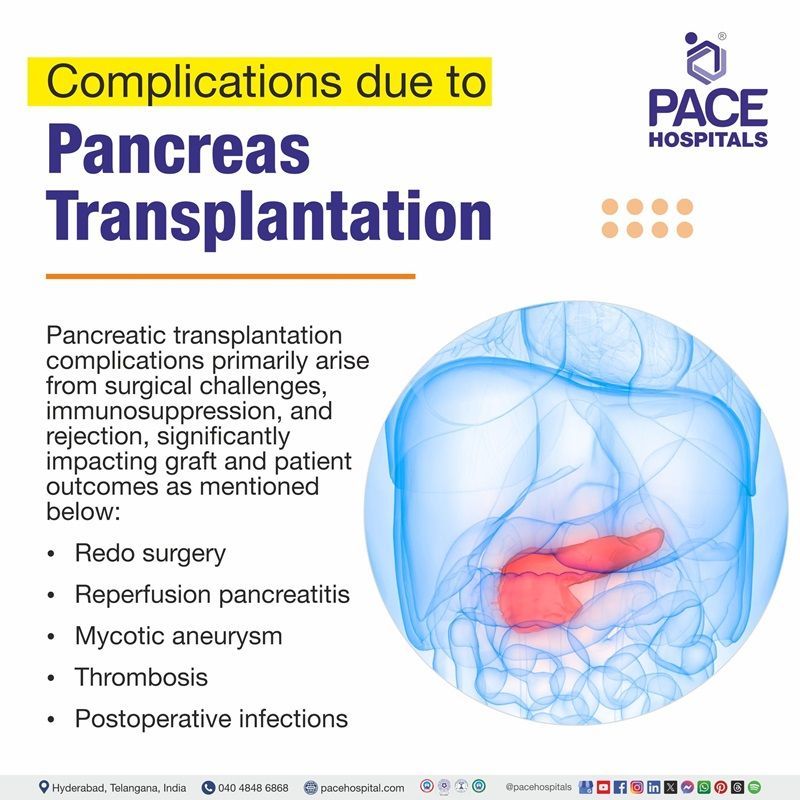
Pancreatic transplant Complications
- Redo surgery: The transplantation of the pancreas is associated with a significant morbidity and death rate, in addition to various reoperation-requiring issues such as haemorrhage, infection, inflammation in the pancreas, and thrombosis.
- Reperfusion pancreatitis: This is another ischemia-reperfusion event that can sometimes result in sepsis and exocrine effusion.
- Mycotic aneurysm: Infection of the vascular anastomosis can also result in the creation of mycotic aneurysms, and intestinal microbe infection during organ retrieval or enteric anastomosis may pose a higher risk during pancreatic transplantation.
- Thrombosis: With every surgery, there is a possibility of bleeding during the procedure; this happens to about 5% of patients. Thrombosis is the most frequent cause of non-immunogenic graft failure; however, it can be minimized by using anticoagulants as directed.
- Postoperative infections: Pancreatic-enteric fistula, graft pancreatitis, enteric anastomotic leak, and intra-abdominal infection are additional complications. Other issues of concern include postoperative infections and cardiac morbidity. The type of immunosuppressive regimen used will determine the range of rejection rates, which is between 5 and 25%.
Pancreas transplant rejection factors
The risk of transplantation rejection can occur due to various factors:
- Nonprimary simultaneous pancreas-kidney transplant (SPK)
- Mismatch of donor-recipient's biological race
- Donor age
- Primary pancreas transplant alone (PTA)
- The factors for rejection include nonprimary simultaneous pancreas-kidney transplant, race mismatch, increasing donor age, and primary pancreas transplant alone. Biopsy of the graft allows the surgeon to accurately identify rejection, and therefore, it should be used for the pancreas transplant monitoring.
- Biopsy of pancreatic graft: The biopsies from the renal graft alone in patients don't determine the pathologic condition of the pancreatic graft. After transplantation, the similarities between pancreas graft biopsies and kidney grafts are not 100%, and grafts can show different types and degrees of rejection. Results of a biopsy taken from a duodenal cuff and pancreas parenchymal biopsy can also be different. The most performed biopsy technique for the pancreas transplant is a percutaneous ultrasound-guided biopsy. This can be done safely and effectively in both bladder-drained and enterically drained transplants.
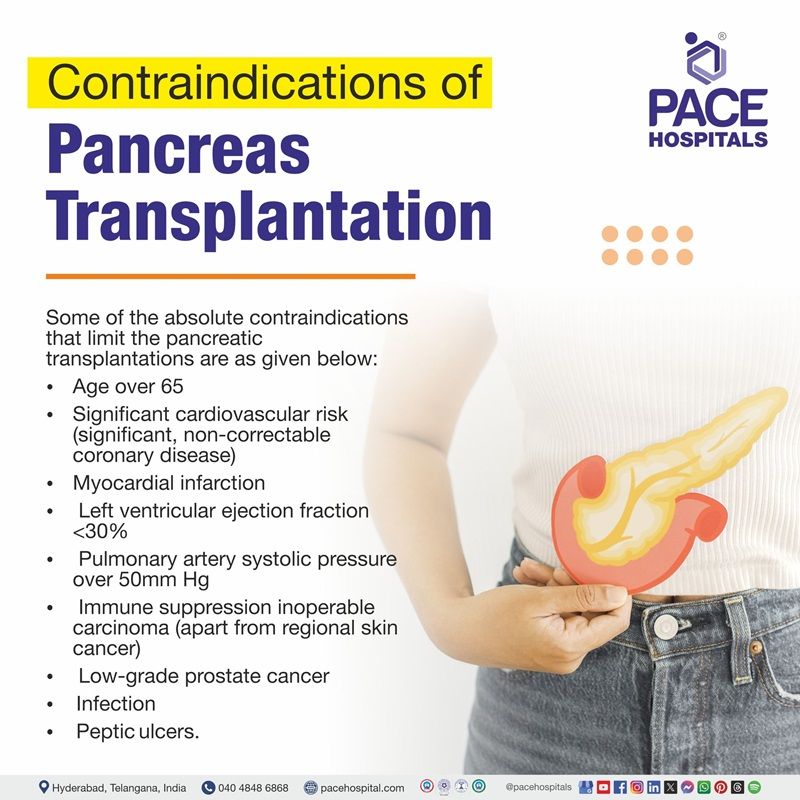
Contraindications of Pancreas transplantation
There are a few limitations to pancreatic transplantation. Such conditions are categorized into absolute and relative contraindications as mentioned below:
Absolute contraindications: Some of the absolute contraindications that limit the pancreatic transplantations are as given below:
- Age over 65
- Significant cardiovascular risk (significant, non-correctable coronary disease)
- Myocardial infarction
- Left ventricular ejection fraction <30%
- Pulmonary artery systolic pressure over 50mm Hg
- Immune suppression inoperable carcinoma (apart from regional skin cancer)
- Low-grade prostate cancer
- Infection
- Peptic ulcers.
Relative contraindications: Below mentioned are few contraindications that are relative in pancreatic transplantation procedure:
- Extensive aortic/iliac and/or peripheral vascular disease
- Alcohol abuse
- Tobacco or drug abuse
- Cerebrovascular accident with long-term impairment
- Active hepatitis B or C virus infection
- Body mass index (BMI) above 30 kg/m
- Insulin requirements greater than 1.5 units/kg per day.
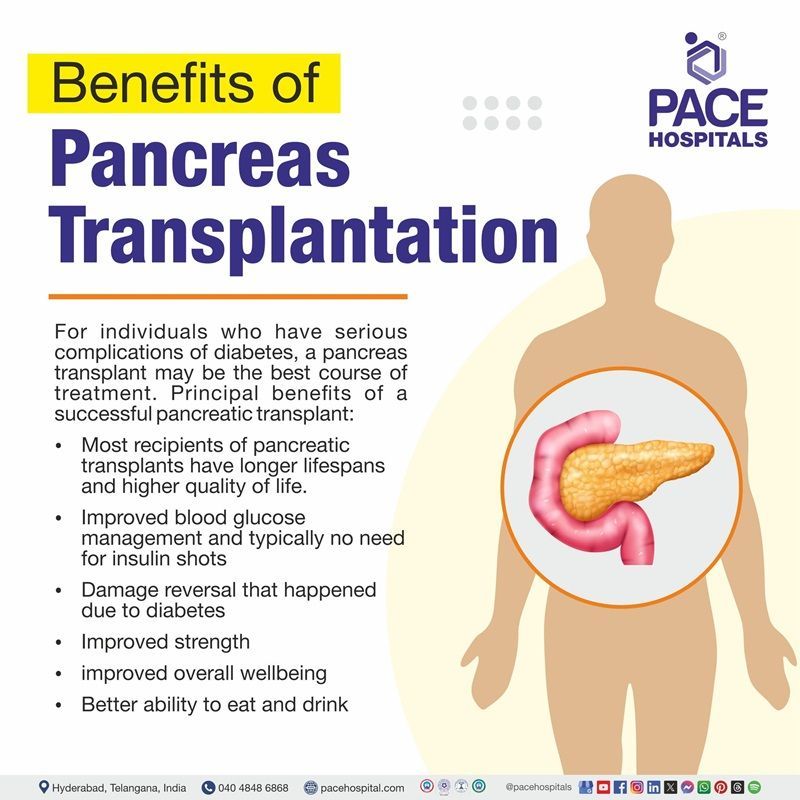
Benefits of pancreas transplantation
For individuals who have serious complications of diabetes, a pancreas transplant may be the best course of treatment. Principal benefits of a successful pancreatic transplant:
- Most recipients of pancreatic transplants have longer lifespans and higher quality of life.
- Improved blood glucose management and typically no need for insulin shots
- Damage reversal that happened due to diabetes
- Improved strength
- improved overall wellbeing
- Better ability to eat and drink
Disadvantages of pancreas transplant
There can be pancreas organ transplant surgery associated risks, notably blood loss. The patient is supposed to take immunosuppressants to suppress their immune system as long as the transplant is working. It's possible that the transplanted pancreas may not function well enough to permit you to stop taking insulin shots. Rarely, death is a possibility.
Role of imaging techniques in pancreatic graft
- When assessing and evaluating the thrombosis in the pancreatic graft, imaging is crucial. Some of the imaging techniques used are:
- Doppler ultrasound
- contrast-enhanced ultrasound
- computer tomography (CT) angiography
- magnetic resonance imaging (MRI)
- magnetic resonance angiography among the frequently utilized imaging modalities.
- Thrombosis can be partial or full, and it can damage veins or arteries. While partial thrombosis can be managed with anticoagulants, complete thrombosis leads to graft loss unless the thrombectomy is performed as soon as possible.
Recommendations to increase outcome of pancreatic transplantation
- Type 1 diabetes is curable with a pancreas transplant, which also shields patients from developing secondary diabetic problems and helps them maintain glycaemic control. Although there is a substantial risk of morbidity and death with this transplant, over the last ten years, improvements in immunosuppressive regimens and surgical procedures have led to a rise in the rate of transplant survival.
- Though surgeons play a key role in pancreatic transplantation, patients seeking care require multidisciplinary methods from endocrinologists, nephrologists, specialized nurses, and other support professionals.
- Despite an increase in survival over the last ten years, the rate of pancreas transplants has decreased. If the organ donation campaign is strengthened and the pool of donors broadened to include less-than-ideal donors including live, deceased, and paediatric donors, this number could rise.
- Physicians who have received further training and education regarding the advantages and hazards of pancreatic transplantation are more qualified to counsel, inform, and recommend patients for the procedure as well as address any issues that patients may encounter while receiving therapy.
Life after pancreatic transplantation
- Pancreas transplant success rate: After a year of transplant, over 96% of patients survive, and after five years, over 83% do. The longest-surviving transplants were 26 years for simultaneous pancreas and kidney transplant, 24 years for a pancreas transplant following a kidney transplant, and 23 years for a pancreas transplant alone.
- Pancreas transplantation is the only treatment that can permanently manage glucose levels without posing a danger of hypoglycaemia. After a decade following pancreas transplantation, diabetic glomerular lesions significantly improve.
- Diabetes and end-stage renal disease patients have a disproportionately high morbidity and mortality rate; nevertheless, pancreas transplantation has significantly increased these patients' life expectancy and quality of life. Additionally, it enhances the healing of specific skin lesions, neuropathy, retinopathy, and quality of life.
Frequently Asked Questions (FAQs) on Pancreas Transplantation
Can a pancreas be transplanted?
Yes, the pancreas transplantation is done in patients with diabetes mellitus – type I to maintain normal blood glucose levels in the body. In this process, donor’s pancreas is transplanted to the patient to perform functions related to digestion process.
How long does a transplanted pancreas last?
After a year, 85–90% of the pancreases are still functional, implying the recipient does not require insulin therapy. 80 to 85 percent of the pancreases stay active after five years post transplantation.
Does pancreas transplants cure diabetes?
Insulin injections are not required if the pancreatic transplant is effective. Nonetheless, diabetes cannot be cured with a pancreatic transplant. It is anticipated to mitigate the adverse effects of diabetes on blood vessels, nerves, and eyes. Diabetes-related abnormalities to the nerves and eyes can sometimes get better.
What is the maximum age to get pancreas transplantation done?
It depends on case-by-case. Your physician might consider several factors to determine if your pancreas can be transplanted.
How long should I be in hospital after pancreas transplant surgery?
Your condition at the time of the transplant and any complications following the procedure will determine how long you stay in the hospital following a pancreatic transplant. You might be discharged in a week or two if you have fewer post-operative issues and are in good physical condition at the time of the procedure.
Why are pancreas transplants risky?
During the pancreatic transplant procedure and in the initial weeks or months following, death is a potential possibility. This usually due to the burden that the surgery imposes on your heart and lungs or by potentially fatal side effects including infections, heart attacks, or strokes.
What happens if your body rejects pancreatic transplant?
Acute rejection of pancreas occurs when the transplanted pancreas is attacked by your body's immune system, which views it as a foreign object. Doctors treat this by using medication which decreases the response from your immune system. Chronic rejection may develop into a long-term problem. Treatment for rejection may be challenging in complex settings.

